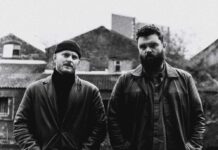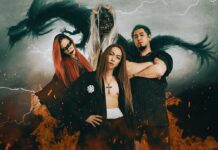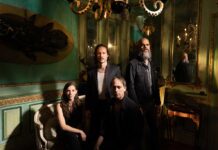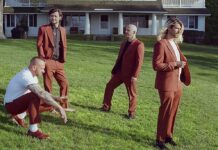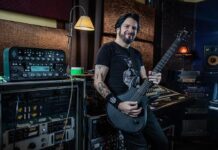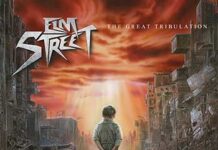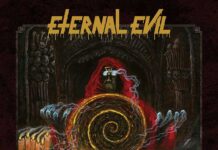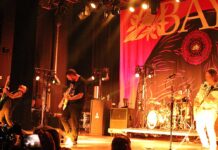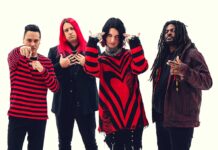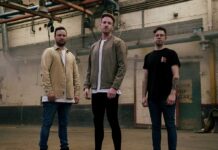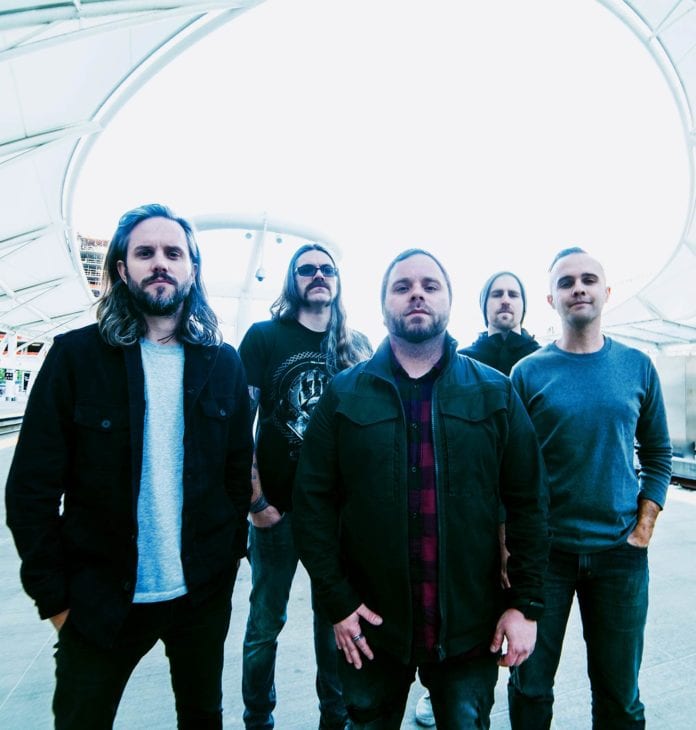
BETWEEN THE BURIED AND ME
Interview with Tommy Giles Rogers, Jr. by Joe Daly
THE BANDS THAT WE STILL CELEBRATE DECADES after their debut are the ones that ignored the rules and the prevailing wisdom of their day and instead challenged listeners to reconsider all that music might achieve. Formed in 2000, Between the Buried and Me has charted one of the most fascinating courses in modern metal across eight stunning studio campaigns. While the rest of the music industry gravitates away from albums and towards the currency of singles, Between the Buried and Me continues to compose some of the most thought-provoking music of its generation. In 2015, the band—Tommy Giles Rogers, Jr. (lead vocals, keyboards), Paul Waggoner (lead and rhythm guitar, backing and lead vocals), Dustie Waring (rhythm and lead guitar), Blake Richardson (drums), and Dan Briggs (bass, keyboards)—launched themselves into the top tier of metal’s visionary artists with Coma Ecliptic, a time traveling metaphysical odyssey through past lives set to a thundering prog metal soundtrack.
Uninterested in resting on their considerable nest of laurels, the band returned this year with its ninth and most ambitious project to date—the two part epic, Automata I and II, with the first installment releasing in the spring and the second in the summer. Set in a cabin deep in the middle of winter, Automatatells the story of a man whose dreams are broadcast to the world for cheap entertainment and corporate profits. As the band’s first outing with new label Sumerian Records, Automatais resplendent in lush atmospheric textures, dizzying tempos, and thundering guitar driven crescendos. We caught up with frontman and founder Tommy Giles Rogers, Jr. for a behind the scenes look at the concept and the making of the band’s finest outing yet.
Between the Buried and Me formed in 2000, not only at the end of the millennium but just after Napster had dealt a deathblow to the old model of the music industry. What are your memories about life in the band back then?
I remember us having an actual demo, where we recorded a few songs ourselves and burnt them onto CDs. I remember Paul and I sitting in our apartment, burning CDs day in and day out, running over to Kinko’s and printing out the shitty layout that we made for the demo. It was an incredible learning experience because it was so DIY and janky, but back then, that was all you could do. Nowadays you can write a song, upload it immediately, and get it right out to everybody, but back then we had to do all of that manual stuff. As far as the Napster thing, we were such a small part of the business that it never really affected us. We were essentially selling CDs ourselves. Even when we got on a label, it wasn’t like we were moving insane amounts of units or anything. Over the years, everything in the business changed, but you don’t always notice it because you’re changing with it. You learn as you go along, just as the business learns as it goes. I still feel like nobody knows where it’s going. We’re all just trying to figure it out.
You released your self-titled debut in 2002. What do you remember about recording that album?
Writing it was so different than it is now. When I think of back then, it was honestly just Paul and I sitting around our apartment, playing guitars. We didn’t have a way to record our ideas or record demos or anything, so we’d have to just keep playing the songs over and over until we remembered it. If somebody forgot it, then that was that (laughs). We recorded that album with Jamie King, and we’ve been recording with him ever since. He just did our last record as well, but back then we were in his parents’ basement and a dingy garage, and I believe we recorded that whole album in five or six days. That’s unheard of today. It was recorded live, minus vocals and leads and stuff like that. I remember recording all night and pretty much every day. A couple days we had work the next day, which was a two hour drive away, so we’d record all night and then drive straight to work. Next day we’d do the same thing. We didn’t know anything different. It was awesome! We were recording our record! When I think of us now, we’d be miserable if we had to do that again, but it was such a great experience back then.
When was the last time you listened to that record?
Man, it’s been years. Like, a really long time. I have no clue. I normally don’t listen to that stuff unless I need to prepare it for a tour. But we don’t really even play that material on tour that much anymore. A lot of our fans don’t know about the first record, although there are obviously the diehards who do. I don’t know, maybe after this interview I’ll go back and give it a listen.
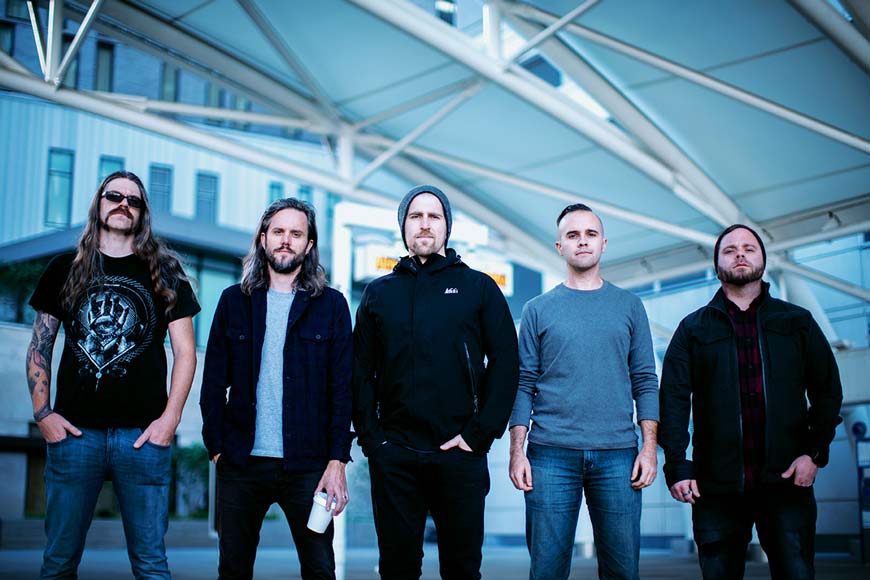
“The coolest thing about all of our records is that they each represent a specific time period.”
2015’s Coma Ecliptic pushed the band up into the next level. Like so many transformational albums, some people got it right away while others took some time to warm up to it. Ultimately, it grew to the point where you recorded an entire live performance of the album for your first DVD, Coma Ecliptic: Live. Three years later, what did you learn through the process of making that album?
I think the coolest thing about all of our records is that they each represent a specific time period. We’re always genuine in our writing, and we tend to expose ourselves quite a bit. Each record represents how we were feeling at that time, and with Coma Ecliptic, we stepped out of our comfort zones a bit and we headed in a new direction. But it wasn’t anything that we really talked about or consciously planned. It just naturally happened. That’s how it works for us. When it’s time to work on a record, we all start writing individually, and we go from there. There’s no discussion, like, “Okay, on this record we need to focus on this or that.” We always want it to naturally reflect where we’re at, at that time. But to your question, with every record, we’re each learning new things from each other and challenging each other along the way. For me, because the music on that record was so different, I approached my vocals differently as well, which pushed me in a new direction. Every album gives me new experiences that prepare me for the next one. It’s hard to say what you learned because when you’re in it, you’re in it 24/7, but that style of songwriting is a part of us, and I think that everything we’ve done translates in some way or another in all of the music that we write from here on out.
The whole idea of a concept album can be a dicey proposition for a band.
Yeah, it’s dicey for me (laughs).
In your opinion, what makes a truly great concept album, and what are some that have inspired you?
I have no idea what makes a truly good concept album. Here’s the thing, there are obviously great albums from the old days, like Pink Floyd’sThe Wall and Dark Side of the Moon,or Ziggy Stardust by David Bowie. The Who also made some great concept albums, Tommy and Quadrophenia, and, of course, I love Sgt. Pepper’sby The Beatles. But honestly, I’m the wrong guy to ask about this because I don’t listen to a whole lot of concept albums. For the most part I find them to be cheesy in one way or another, and it’s really hard for me to find ones that are tasteful and cool and with lyrical themes that I’m drawn to. When we first talked about doing a full out concept album, which was The Parallax II: Future Sequence (2012), I was so hesitant because of those very beliefs. But it’s always been my goal to make a concept album that’s interesting enough that the story can carry an entire record and with enough elements, both musically and conceptually, that people can grab onto and relate to it.
Fans might already have an idea of Automata’sconcept, but can we dig a bit? What’s the plot that underpins the album?
This is my least favorite part of writing concept records—explaining what it’s about (laughs). But it’s about a guy who starts working with a company that broadcasts his dreams throughout the world as entertainment. His very imaginative and bizarre dreams make him a celebrity. In the story that everyone is watching, he’s searching for his wife and son, but we eventually find out that they don’t really exist. They turn out to be robots. It’s initially disguised as life as he knows it, but we find out that it’s a dream. The story comes from both his perspective and the audience’s perspective, and it also touches on other themes like corporate greed and big business. There are a lot of different layers.
It sounds dystopian.
It is, but it’s also positive. He’s searching for something that he’s always wanted, and in his mind, he finds it and he’s happy where he is. As far as we know, he just stays there. I tried to end it on a positive note this go-round, because the stories I write often end on a bleak note.
Tell us more about the protagonist. Who is he and what’s he like?
Mmm…that’s tough. He’s definitely suffering the pain of loss, although we never find out why. There’s a song on there called “Millions,” which is from a child’s perspective. It’s a child sitting in his backyard and he’s missing something, although I never say what, even in my notes. He could miss something like a teddy bear, a blanket or a toy—something that matters only to a child. But I like to think that it’s more of a father figure or family element that he’s missing because that’s what he’s searching for in his dream. He’s somebody who easily gets taken advantage of, and I think that’s why he eventually goes out to the desert and meets up with this company called Voice of Trespass that uses his situation to take over his life and exploits him for profit.
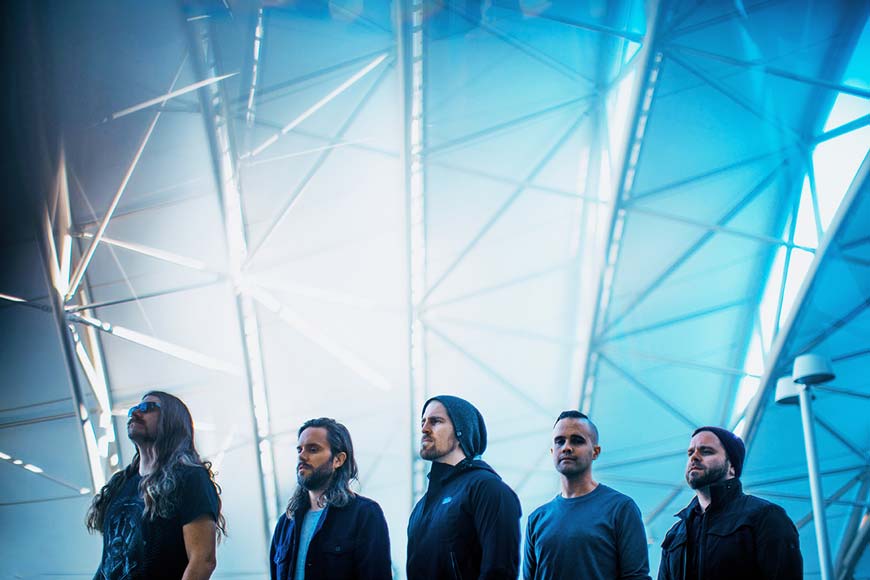
“My lyrics can be abstract and vague at times, but I think that makes it more exciting for the people who really dive in.”
Because it’s a concept album, some context is required for people to fully immerse themselves in the experience. Do you ever worry about giving away too much in terms of plot or lyrics?
Not really, because I hope there are people that really dive into the story and relate to it. I know that my lyrics can be abstract and vague at times, but I think that makes it more exciting for the people who really dive in. There are different types of fans. There are fans that just listen to the music and don’t read a single lyric, and that’s totally fine. I’m that way with a lot of music. I can’t say that I dive into every single thing that I listen to. But then there are kids who get really into it, trying to figure out why the artwork is the way it is, what the song titles mean, the symbolism in the lyrics, etc. I think that makes it that much more special for them. So, I’m never thinking of it as giving anything away because ultimately I am trying to tell a story in an interesting way and through songs.
What about the track “Yellow Eyes.” It strikes me as particularly jagged and one of the more arresting moments on the record.
Yeah, that song is pretty crazy. When I listen back to that song, it’s pretty schizophrenic as far as vocals go, which I don’t know if I intended at the time I recorded them. My job is to complement the music, and when we finished that song it felt, like you said, very jagged and very aggressive, and it took you to all of these different places, so I had to find a way to connect it to the plot. It’s part of his search when he’s in this strange world and at this point he’s realized that his son isn’t real and he keeps seeing these robotic eyes in the woods, watching him. It’s this creepy feeling that he has, where he’s realizing that nothing is normal. Even the moon is red, and he’s starting to freak out. Our songs are so damned long, and I don’t have a way to listen to it right now, but the song goes from there into a lot of different directions, and you can feel that in both the lyrics and the music.
In a way, concept albums are another form of cinema. Virtually all movies rely on music to help tell the story. It creates moods, introduces themes, and music is the last thing you hear in every movie. So, what are some of your cinematic influences?I’ve always been drawn to films where things aren’t what they seem. I’m a huge fan of Twilight Zone, which I think you can tell by my stories. I’d also say that The Godfathermovies are some of my favorite films, but I don’t think they’re anything that necessarily inspires my writing. I also really love good dialogue, like in Quentin Tarantino films. His last movie, The Hateful Eight, was a big inspiration for me wanting to use a cabin as a setting in my own story. I love the fact that you can have one scene in a single set and still pack it with great dialogue and make it so interesting. When people achieve something like that, it blows my mind because they tell an intense story with pretty much just dialogue. When I write, there are so many times that I struggle, and I think how hard it must be to create such a dramatic scene with people all just sitting there.
It does seem like movies and television are moving towards more dialogue rich, character driven stories these days.
Totally. I’m a huge Breaking Badfan. It’s one of my all-time favorite shows because of the dialogue. And because within the story, you’ve got all these colorful characters, and as the story unfolds, you start to feel differently about them. It’s really interesting when you have a character that seems evil one day, and the next day you’re on her side. I suppose it’s like that in TheGodfatherfilms as well. There’s an ambiguity that I’m drawn to. But honestly, I can’t remember the last time I watched a movie. I just watch a lot of ID (laughs). Investigation Discovery. It’s a channel that has a lot of murder mysteries and real life stories. I watch a ton of that.
Beyond movies, what are some other non-musical influences that inform your creative visions?
Well, when we sit down to write the music, we’re not following a story. At that point I don’t even know what the music is about, really. I don’t remember specifics, but I had a tentative story in mind before we started writing the new album, although I ended up rethinking it and I decided not to go with it. So, the music isn’t driven by the story, but vice versa—the story is influenced by the music. When we started writing, it was naturally a little heavier and it took us to a lot of different places. And that’s how it happens with us. We’re an adventurous band when it comes to songwriting, and there was a very dark mood initially. I knew there were certain ideas that I wanted to explore, but when I sat down to write, I wasn’t super excited by the idea of writing a concept record.
But yet, you decided to keep going with finding the right concept?
Well, I hit a point in the writing process, which happened several times during that process, when I was out of ideas, wondering if I was repeating myself or if I was doing this all for the sake of just doing it. At the time I was listening to Bob Dylan, and you can hear his emotions—he wears them on his sleeve. I was writing these stories and I realized I didn’t want this to feel like a day job. I wanted to feel invested in it. And so I scrapped my original idea and asked myself, “What is my worst case scenario?”That was obvious—waking up and losing my wife and my son, so I thought, “Okay, I’ll start there.”
So, you went to the most painful place you could imagine and then you asked yourself, “How could I get there?”
Right. But I also knew that the character had to be in search of something and for some reason, I knew that I wanted the story to take place in a cabin somewhere in the middle of winter. Then I had an idea that eventually backfired, but then I later realized it was a blessing in disguise. I was talking about Breaking Badearlier and how I love shows that play out week by week, and they don’t necessarily know what’s going to happen in the future. So, that became my plan.
Yeah, I remember reading an interview with Breaking Badcreator Vince Gilligan who said that the show was like a road trip. He knew where the show would end and the spots they needed to visit, but everything else—other plot lines and characters—were things that just came up along the way.
Totally. I’d just start with one idea and see where that idea flowed, and then I’d move on to a new idea. I just followed the story where it took me as I wrote it. In the past, I’d have everything figured out before sitting down to write, so this was new territory for me as a songwriter. Because of that, I hit a lot of roadblocks and had a lot of writer’s block, but in the end I think it gave the story the kind of real emotion that wouldn’t otherwise be there. And I feel a lot more connected to the story because of all that. When the music was being written, I was trying to get the story together. There’s a lot of pressure in having the music first and doing the lyrics later. We had all of these great songs, so I knew I had to come up with some kickass lyrics and a kickass story that works with the music. I didn’t want to let myself down, and I didn’t want to let the band down, so that’s how I approached it.
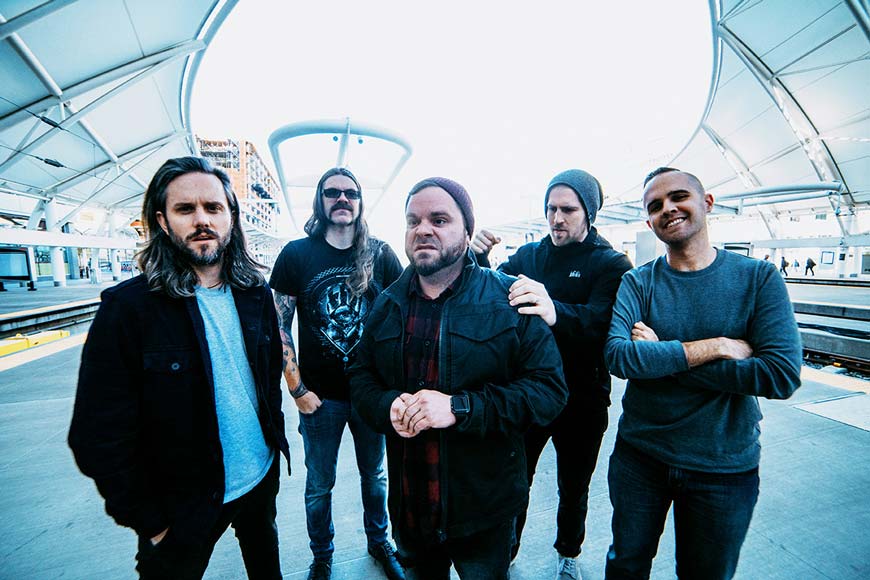
“We’re the kind of band where you don’t know what’s going to happen next at all times.”
What’s the collaboration like during the band’s writing phase?
Whenever it’s time for us to sit down and start writing a record, we write a lot on our own and then get together and share what we’ve been up to. Every few years we all grow and our writing styles change, and it’s exciting to see where all the members stand. So, our only goal is to push ourselves, to try new things, and to evolve. Those moments are incredibly important at this stage in our career. We need to step out of our comfort zones and see where we can push our sound, and I think we did that with this record. I love the way we write because I never know what’s going to happen. Writing is my favorite part of this job, by far.
Between the Buried and Me is constantly being hailed as one of the preeminent prog metal bands on the scene these days. How do you feel about that label? Is it accurate or maybe even too restrictive?
I don’t think too much about it, honestly. When you put things in writing and especially music, you have to describe it somehow, and that’s an easy way to describe us. I can’t say that it’s incorrect, but at the same time I don’t know how I’d describe us. I don’t think that because people put that label on us, it affects the way we write or the way we play. We’ve always done our own thing, and that’s what’s always been liberating about this band. From day one, we knew we wanted to be a metal band that did things differently, and that’s literally what Paul and I set out to do in the beginning. I think that’s what we’re all still trying to do.
Do you see yourselves as a prog band?
We’re aggressive, and yeah, we have what people might call prog moments, but I don’t think of music like that. To me, Radiohead is a prog band, if you’re really trying to define that. I think we’re the kind of band where you don’t know what’s going to happen next at all times. There are different types of bands. There are the ones where you always know what they’re going to sound like. Then there are ones where you hit play and you’re excited and maybe a little nervous because you don’t know what’s going to happen, and I think we’re on that side of things. So, whatever that’s categorized as, that’s what we are.
One of the things that other artists consistently say is that they don’t exclusively listen to the type of music that they play. Most of them have tastes that run far beyond their own genre. Is that true for you? What do you listen to when you’re away from the band?
I still listen to a lot of metal and I always have. I’m a metal head at heart. That’s what I grew up on and I’m always drawn back to it. I wouldn’t say that I listen to much music in our genre, but I still listen to a lot of aggressive music. When I’m home I listen to a lot of old jazz. It’s a comforting thing. I just love that old music from the 40s and 50s. But I’m always actively searching for new music. I have a notification on my calendar every week that tells me when new music is coming out, and I try to check out a lot of new bands. I just love finding new music, and my tastes tend to run all over the place. I listen to a lot of electronic music, and I’m also a total classic rock guy. I love The Beatles, but I also love black metal. I honestly enjoy most music. Well, except for modern country. I can’t stand that (laughs).
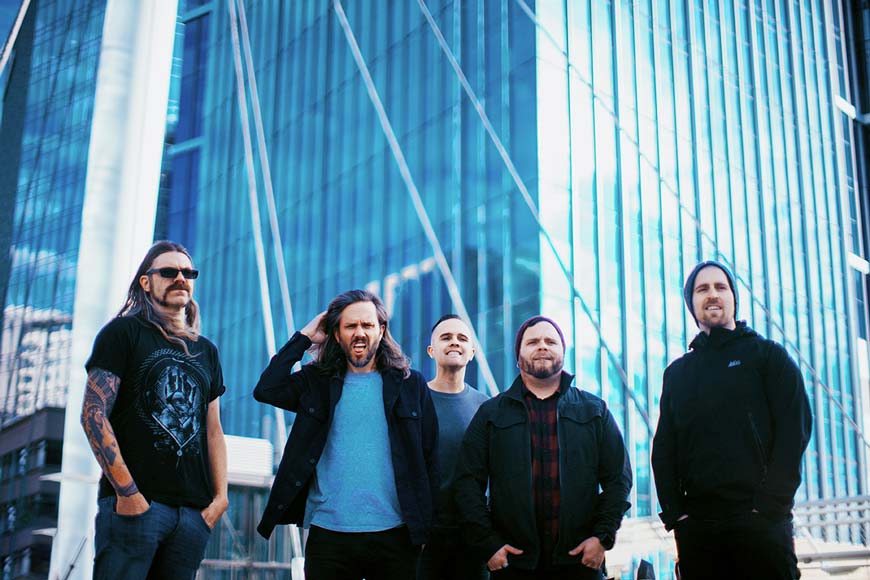
“With every record, we evolve in what we do and we all improve in our own ways.”
What was your first concert?
Bon Jovi and Skid Row in 1988.
How was it?
It was amazing. I didn’t know who Skid Row was at the time, and it was their Youth Gone Wild tour. I went to see Bon Jovi with my mom and sister, and Skid Row stole the show for me. That’s what started the 80s metal thing for me, for sure.
Where do you think the most exciting music is being made these days?
Hmmm…I’m always drawn to Scandinavian artists for some reason. I love Ulver, just a huge fan of theirs. As far as a band in our genre, I think Leprous is phenomenal. I listen to a lot of music from that region—Norwegian and Swedish metal. Even when I was younger I’ve always been drawn to black metal. There was so much experimentation within that scene that I don’t think a lot of people realized, even back around 2000 and the late 90s. A lot of those black metal bands were ahead of their time.
When you think of all of the bands that get together in basements, garages, and bedrooms, very few last a year or two, but you guys have stayed the course for nearly two decades. What’s your secret to longevity?
When you’re on tour, you’re essentially living with each other for months on end. If you don’t get along, it makes it miserable for everyone involved. I think that you really learn a lot about each other in that situation and you figure out when someone needs space. It’s just like living with any roommate. As far as writing, we sync so well and we work so well together because we’re all friends. We enjoy each other’s company, and we still hang out and joke around together. But we know how to put space between us when we need to. I think people need to chill more, and for us, we all take time to chill and we don’t take things too seriously. There’s no rhyme or reason, but we’ve had member changes in the past—13 years ago or so—and if people aren’t getting along, it’s hard to change that. The current lineup has always had a level of respect for one another, and we’ve always gotten along really well. I think you either luck out with the group you have or you’re constantly struggling to make it work. I can’t even remember us getting into a fight.
Are you saying that the band has never come close to breaking up?
Nope, never. We’ve never had that kind of moment. With every record, we evolve in what we do and we all improve in our own ways. When you get together and see how everybody has grown, it motivates you to keep evolving yourself. Even when we head into the studio to record, it’s not always easy, but it’s super smooth. It’s a bunch of friends hanging out and recording a record. With us, it’s not stressful at all. I know that for some bands, recording and writing can be a stressful time, but for us it’s all very enjoyable. I think that’s a huge reason as to why we’ve lasted as long as we have.
Where do you see the band in 10 years?
I’ll be 47, and hopefully I’ll still be living in California. I don’t know. I’d like to think we’ll still be playing music. If it’s Between the Buried and Me, that’s awesome, but I just hope that 10 years from now we’re all still being creative in one way or another, and hopefully we’re all still good friends. But I don’t see the band going anywhere. I don’t see the point in a band breaking up, unless you absolutely hate writing music together. As you get older, touring starts to suck a little more, but you can always be a part-time band and write records together. It’s always been weird to me when bands break up when they’re still getting along and they still like writing together.
But when a band gets to the point where they’re constantly at each other’s throat, breaking up might be the most creative thing they can do.
True, but when bands break up, nobody gets the full story. But as far as we go, hopefully we’ll still be kicking it.
As a vocalist, how do you deal with the passage of time?
I just try to take care of my voice when I need to. I hope I can still scream when I’m 47. I assume I still can. Chuck Billy from Testament still has it, so there’s hope for me!
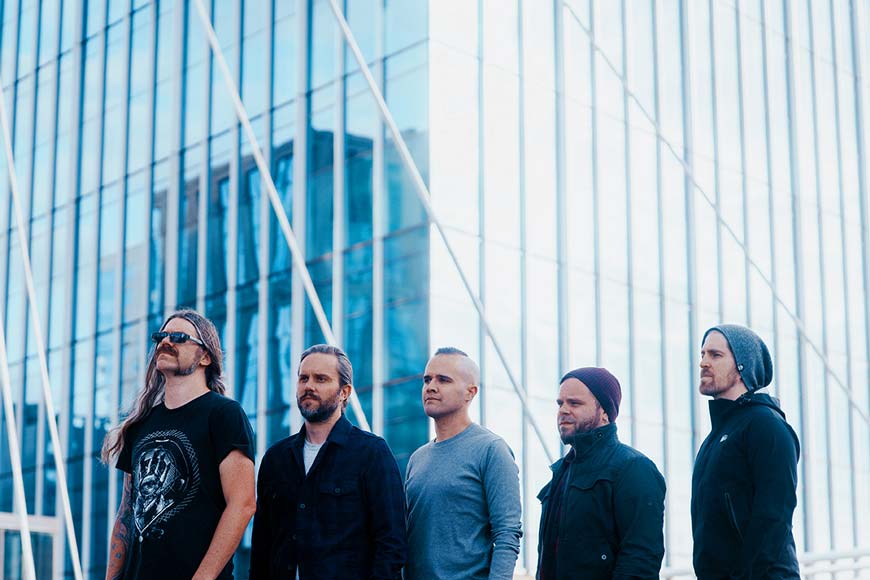
Let’s wrap this up with five quick hit questions. First one—science or spirituality?
Science. I was raised in a Christian household. I’m not against religion, but it never seemed to fit me. I never liked the segregation idea in some religions, or the my way or the highway mentality. I guess, I’m essentially a hippie because I think everybody should just chill out and get along. Ever since I was young I never liked it. I can understand why people need religion, but it’s never been something that I need in my life.
Horror or comedy?
Wow, that’s tough. I like the mix of the two. I love when comedy and horror mix. I’d say that lately the answer would be horror because most comedy is terrible nowadays. Maybe a few decades ago I would have chosen comedy.
Dogs or Cats?
Damn. I love both so much. I guess, I’d have to go with dogs, but I do love cats.
Black Sabbath or Metallica?
I’m going to have to say Sabbath. I go by ratio of good versus bad output, and I’d say that Sabbath’s ratio is better than Metallica’s.
Touring the US or touring Europe?
I’d have to say the US, because our shows are better here and more people know who we are. And you don’t have to worry about weird cell phone plans and all that stuff.




